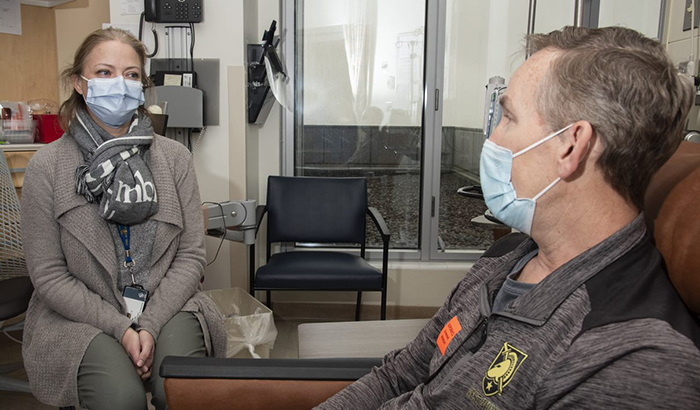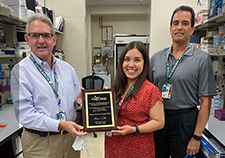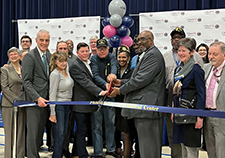Office of Research & Development |
 |


Dr. Julie Graff, an oncologist at the Portland VA, consults with Army Veteran David Atkinson. She's using precision oncology to treat his aggressive prostate cancer. (Photo by D. Michael Moody)
February 25, 2021
By Mike Richman
VA Research Communications
"I just tell every male I talk to nowadays to get his PSA checked. You just never know."
For nearly three decades since his departure from the Army, David Atkinson found no need to use VA health care services. He’s discovered it’s never too late.
Atkinson has a case of aggressive prostate cancer. Thanks to treatment at the VA Portland Health Care System, his condition has improved dramatically in recent months through precision oncology—the molecular profiling of tumors to identify targetable alterations that can be treated therapeutically.
“I always knew [VA services] were out there,” he says. “But prior to my cancer diagnosis, I was always extremely healthy. Literally, I’d see a doctor once every 10 years … for a checkup at the ages of 30, 40, 50. So I never had a need or a reason to use VA services because I’ve never had anything other than a normal doctor checkup for years, which my insurance covers no problem.”
This time, there was a problem.
Last year, Atkinson took part in a non-VA trial to test a combination of immunotherapy drugs used to treat aggressive—or metastatic—prostate cancer. In immunotherapy, a form of precision oncology, organisms in the body’s immune system are used to fight cancer.
But as his condition worsened, the physician leading the trial at Oregon Health & Science University (OHSU) in Portland, Dr. Julie Graff, sent the tumor from his original 2018 biopsy to an OHSU lab for genetic sequencing to help guide further therapy. Technicians found multiple mutations—the changing of the structure of a gene. One of them is called microsatellite instability (MSI), a condition in which the tumor makes multiple errors in DNA replication. Only 3% of prostate tumors have MSI, according to Graff, an oncologist. Upon review of the report, she suspected he had been on placebo in the control group and that his tumor had a good chance of responding to immunotherapy.

VA researchers using AI to decide best treatment for rectal cancer

VA center training the next generation of researchers in blood clots and inflammation

AI to Maximize Treatment for Veterans with Head and Neck Cancer

VA opens new research center to seek novel arthritis treatments
Knowing that MSI tumors tend to react well to immunotherapy drugs like pembrolizumab, which was among the combination tested in the OHSU trial, Graff prescribed that medication for Atkinson. The U.S. Food and Drug Administration (FDA) has approved pembrolizumab for any tumor type with MSI.
“I was delighted when we found MSI in his tumor,” she says, believing the finding would lead to a promising treatment for Atkinson.
However, his private insurance company refused to pay for the pembrolizumab, claiming he needed to be unblinded from the study to see if he was already on the drug. Graff refused to unblind him because she thought doing so could jeopardize the clinical trial results. More importantly, she felt he had a clear indication for pembrolizumab. But she persevered with the insurance company, filing an appeal and doing a peer-to-peer talk with the company’s doctor. She was denied twice over a six-week period.
“I explained to the doctor why it’s important that David get this drug,” Graff says. “He was like, `Okay, okay, but it’s not my decision ultimately.’ Then we got a letter that he was turned down again.”
Meanwhile, Atkinson’s PSA (prostate specific antigen) score, the main screening tool for prostate cancer, escalated to nearly triple figures in November. Plus, as the cancer metastasized, pain increased in his right thigh, pelvis, and other parts of his body.
Graff gave up with the insurance company. Knowing Atkinson is a Veteran, she instructed her team to arrange for his enrollment in the Portland VA, where she’s the section chief of hematology and oncology, so he could be treated with pembrolizumab without any potential resistance. He was enrolled on Nov. 19 and began treatment two weeks later.
Both Graff and Atkinson were relieved when the wait was over.
“When Dr. Graff called me and said, ‘The VA has approved the medication, we have an appointment next week for you,’ Atkinson recalls, “I was ecstatic because of everything I know about Dr. Graff and the treatment she’s been giving me the last two years. She’s highly regarded in her field. She’s knows what she’s doing. If she says, `This drug should work,’ I truly believe her 100%. When she said she got me approved for this drug through the VA hospital, my wife and I were overjoyed.”
Atkinson has since received five shots of pembrolizumab, one every three weeks. His PSA spiked from 95 when he first started to 115, before plummeting to 0.2 in his last blood test on Feb. 22. He and Graff became emotional when the drug began working.
“When she and I saw the numbers, some tears rolled in because we’ve been fighting this obviously for two years,” Atkinson says. “To see the drug working as effectively as it is, like she believes it would, and I hoped it would, we were just overwhelmed with joy.”
In VA, prostate cancer is one of the most commonly diagnosed forms of cancer among Veterans, many of whom also have service-related exposure to carcinogens. Prostate cancer is most common in men ages 65 and older. The disease is usually found in its early stages and often grows slowly. Most men live with the cancer for decades without symptoms and die of other causes even without early surgery.
Currently, VA is partnering with the Prostate Cancer Foundation (PCF), a philanthropic group that funds research to prevent and cure prostate cancer. The partnership is centered on speeding the development of treatment and cures for Veterans with metastatic prostate cancer through precision oncology. About half of the $50 million that PCF donated to VA in the five-year partnership is aimed at building a network of VA sites that are doing precision oncology.
Precision oncology is fast developing and has entered the mainstream of clinical practice, with application to a myriad of cancers. Each cancer patient may have different mutations in play, and researchers are learning how to leverage this genetic information to improve outcomes. Immunotherapy, chemotherapy, and targeted therapy, all of which are used to kill aggressive cancers that have spread in the body, are forms of precision oncology.
Microsatellite instability, the alteration found in Atkinson’s tumor, results from mismatch repair (MMR) deficient cells, which usually have many genetic mutations that may lead to cancer. Knowing if a tumor is MMR-deficient may help clinicians plan treatment or predict how the tumor will respond to treatment. MSI tumors, Graff notes, tend to respond to immunotherapy drugs like pembrolizumab because the tumors have multiple mutations.
“MSI leads to multiple genetic mutations, and some of those mutated genes will translate into a protein that the immune system has never seen before,” Graff explains. “The immune system has `tolerance’ for most of the proteins in your body, because you do not want your immune system to attack something that belongs there, such as the colon in patients with Crohn's disease. When your tumor makes brand new proteins, your immune system can be especially sensitive to those and attack the tumor aggressively. That's why the FDA approved immunotherapy for any tumor type as long as it has MSI.”
Unfortunately, it’s unknown how long an immunotherapy drug like pembrolizumab will continue to attack the tumor before the cancer resists it and starts spreading again. When Atkinson’s tumor was first biopsied in 2018, his PSA level was at 350. He went on what he called a “starter base” hormonal therapy drug, with his PSA eventually falling to the range of 4 to 6, before it again took an upward trajectory.
Graff has told Atkinson the pembrolizumab should be effective for “a while,” but that his cancer will always remain active in one form or another.
“I said, ‘ What’s a while?’” Atkinson says, “She goes, ‘ One year, two years, three years. We don’t know exactly.’ We’re just praying every day that a while is a number of years.”
“David is very likely to do well on pembrolizumab,” Graff adds. “If he were in the community, he may not be able to get it covered. However, he’s a Veteran who proudly served his country. Because of that service, we were able to get him appropriate therapy.”
Pembrolizumab works by revving up the immune system, Graff explains. An overactive immune system can attack healthy tissue in places like the colon, the thyroid, the lungs, and many other organs, she says.
In addition to the drop in his PSA, Atkinson says the pain he once felt in his pelvis and thigh has dissipated. In addition, the side effects from the pembrolizumab have been minimal. The only one he knows of thus far has been extreme fatigue in the afternoon. Having once carried about 20 pounds a day in equipment with gear on while in combat during the Gulf War, he’s trying to counter any muscle atrophying the drug may cause by lifting light weights (see sidebar). Light walking, which he once struggled to do, has also been in his recovery plan.
In Graff’s opinion, VA’s ability to enroll Atkinson and immediately get him the cancer treatment he needs exemplifies how the agency does “incredible things for our Veterans.”
“VA being so mission-driven to help Veterans really served David well,” she says. “We are taking more patients from outside VA who may be eligible for benefits and getting them enrolled quickly, specifically when they have cancer. David benefited from that. I wasn’t getting anywhere with his insurance company. He may never have gotten the immunotherapy if he weren’t a Veteran. I struggle with that with other patients who aren’t Veterans. Sometimes, I just can’t get them their drugs.”
Atkinson says the doctors, nurses, and other staff members who have provided him care at the Portland VA have been “truly amazing.” Having been on the healthy side before his bout with prostate cancer, he’s urging all of the men in his family and circle of friends to get a PSA screening.
“I never got mine checked until all of this happened,” he says. “I was always healthy. I never had any issues. I rarely ever got sick. I just tell every male I talk to nowadays to get his PSA checked. You just never know.”
Thirty years ago this month, David Atkinson was part of a cavalry regiment immersed in a ground offensive in Operation Desert Storm. The Army unit headed north from Saudi Arabia into Iraq, then moved into northern Kuwait and engaged Iraqi Republican Guard forces, driving them back into southern Iraq.
During the ground offensive and in the ensuing months, Atkinson and his comrades were exposed to many burning oil fires that Iraqi forces set during their retreat.
“The fires filled the skies with smoke and soot that we breathed in daily,” Atkinson remembers.
Today at age 56, Atkinson is in another battle—this time with metastatic prostate cancer (see main story). He’s being treated with an immunotherapy drug at the Portland VA, with very positive results thus far. Most recently, his PSA level was at 0.2, after a high of 115 in December.
Currently, VA researchers are conducting a wide range of studies to better understand and treat the health problems experienced by some Veterans of the Gulf War. Many who were deployed like Atkinson experienced environmental and toxic exposures involving smoke, chemicals, and other substances that could potentially damage one’s health.
As many as a third of the nearly 700,000 men and women who served in the Gulf War are affected by a cluster of medically unexplained chronic symptoms called Gulf War illness (GWI). The symptoms can include fatigue, headaches, joint pain, indigestion, bowel discomfort, insomnia, dizziness, respiratory disorders, skin problems, and memory impairment. More information on illnesses linked to Gulf War service can be found here.
Atkinson, a 1987 West Point graduate, was in the Army from 1987 to 1992 and reached the rank of captain. Despite his health challenges of today, he does not regret having served in the U.S. military.
“I am proud to have served my country,” he says. “The outcome doesn't matter.”
--- Mike Richman
VA Research Currents archives || Sign up for VA Research updates